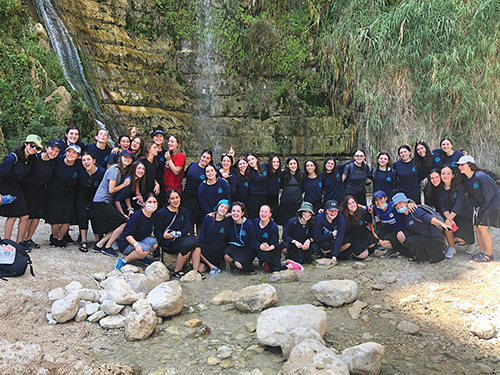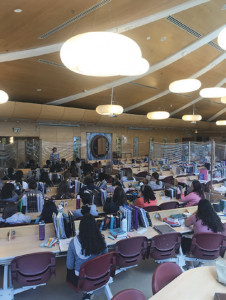
On Erev Rosh Hashanah Israel entered a three-week lockdown, severely limiting interaction and movement. Yeshivot and seminaries in Israel have had to adapt their programs to the ever-changing COVID reality—almost on a daily basis. How are they managing to ride the current storm, while keeping their students and community safe?
COVID-19 restrictions haven’t stopped Midreshet Lindenbaum, part of the Ohr Torah Stone network, from providing their students with a full schedule—including trips to the beach and Ein Gedi. After the initial two-week quarantine period, students united into one capsule/family unit, where they were allowed to interact unmasked.
Their spacious beit midrash has been divided into capsule sections, so that the other programs on campus can be held there safely without exposures between the capsules. Teachers are teaching in person, behind masks or screens in well-ventilated classrooms or in outdoor areas. High-risk faculty members are teaching on Zoom.
The capsuled Midreshet Lindenbaum beit midrash, COVID-style. (Credit: Cheryl Burnat)The Israeli programs at Midreshet Lindenbaum discovered COVID-19 cases the day the overseas group left quarantine, and they immediately sent their students home. Due to the strict separation between the capsules—including different paths around the building, special meal service, hand sanitizer everywhere—no students in the overseas program contracted the virus.
The question of keeping the surrounding neighborhoods safe is one that has been discussed in the Israeli news. Rabbanit Sally Mayer, rosh midrasha at Midreshet Lindenbaum’s overseas program, made it clear that they were taking every precaution: “Our students are allowed to leave unauthorized only for local walks/runs or essential trips to the local store, and need special permission for all other outings. They may not interact with anyone outside their capsule unless they are masked and distant from them, and they take this rule very seriously.
“We have been spending Shabbatot all together and look forward to meaningful chagim as well! We are in constant communication with the parents, who have expressed their appreciation for our careful consideration of the students’ physical as well as mental health.”
The lockdown from Rosh Hashanah until Simchat Torah has created challenges, especially as this is usually a fun time of year for gap-year students, but Midreshet Lindenbaum is prepared. It has an outdoor minyan for Rosh Hashanah and Yom Kippur, as of this writing, and teachers will still be coming in to teach in person. They have ordered new equipment to make the lockdown time more fun—ping-pong tables, yoga mats and exercise equipment—and plan to start a vegetable garden and bring in workshops for the students as well.
“We are a family and will be spending the chagim together as a group, with students bringing their minhagim to share with everyone. We are building a large sukkah, which they will decorate and make their own,” Mayer concluded.
Lori Linzer, mother of Gila, a Ma’ayanot Yeshiva High School for Girls graduate from Bergenfield, said: “I must say that I’m so impressed with how beautifully planned and orchestrated the girls’ arrival and quarantining has been so far. It’s clear that a lot of thought and care and love has gone into it, and we are very grateful to Lindenbaum for that. We are looking forward, B’ezrat Hashem, to a very special year.”
Yeshivot have also kept their talmidim learning and enjoying being in Israel, while keeping to the guidelines and keeping the community safe.
Rav Reuven Taragin, dean of the overseas program at Yeshivat HaKotel, said, “This year’s limitations outside yeshiva have allowed the boys to be more focused. Baruch Hashem they are learning even better than usual!
“Having been out of school for a while and knowing the year in Israel wasn’t something they could count on, the opportunity of learning here in the Old City means even more to them. The boys did very well in integrating into the regular yeshiva life after bidud (14-day quarantine). Baruch Hashem we brought the boys two weeks before Elul so they had completed bidud and were able to start learning on Rosh Chodesh, and they have had a full Elul Zman.”
The number one priority, Rav Taragin said, especially as the COVID numbers are going up, is protecting both the boys and the community. In order to do this, during the capsular period, the boys avoid interaction with anyone outside their own capsules.
“Even during capsule breaks, we provide guidelines over and above what the Health Ministry requires. Unlike regular Israelis, our students do not have homes to go to in the event of getting sick or needing quarantine… We don’t just want to protect them from COVID-19. We also want to help them avoid needing another bidud, which they would need if they are in contact with a diagnosed COVID carrier.
“Boys are meant to avoid public transport and any public gatherings and being indoors with other people. Eateries are only for takeaway, and places they go for Shabbat have to be able to commit that the boys will be a safe distance from others at all times.”
Rav Taragin explained that they are also very careful about students who are not feeling well.
“We are in touch with doctors and the Health Ministry all the time, as to when to separate a student from the others or whether to test for COVID-19 if they are displaying possible symptoms. It is a challenge, but b”H we are dealing with it.”
Rav Taragin said, “Yeshivat HaKotel in the Old City at the center of the Jewish world is the perfect place to be for the three-week lockdown over the chagim of Rosh Hashanah, Yom Kippur and Sukkot, which are focused on this location.”
“Like in regular years the boys are welcome to stay in the yeshiva during bein hazmanim and we provide meals etc. In addition, we have planned a special bein hazmanim program that includes learning, meaningful experiences, and fun activities.
“Baruch Hashem the talmidim have had a great experience thus far and we look forward to the year continuing to be a meaningful one for our students—because of the wonderful opportunities there are here for growth and learning and because I am sure they will continue not taking anything for granted. I am sure that it will be a year boys remember for the rest of their lives,” Rav Taragin concluded.
Coby Zwebner, a shana bet talmid at Yeshivat HaKotel, from Teaneck, said, “Unfortunately, the COVID-19 situation in Israel is not improving and therefore it is extremely necessary for there to be strict rules in place in order to protect us and the citizens of Israel. The yeshiva so kindly organized a delivery service in which many of the restaurants and supermarkets in the Old City can deliver all the food and groceries we need to the yeshiva. Therefore, there is no need to expose ourselves and risk the lives of others.
“In addition,” he said, “we are no longer permitted to use public transportation, but fortunately the yeshiva has done everything they can to help us fulfill any of our essential needs that would usually require public transportation, like haircuts.”
When asked about what they will do during bein hazmanim, being the lockdown period, Zwebner said, “We are very fortunate to have the zechut to spend the chagim with many of our rebbeim. Additionally, Rabbi Taragin is implementing a morning seder and night seder during bein hazmanim so we can all have the opportunity to finish Masechet Sukkot, which we have been learning for the past month!”
“Lastly,” he concluded, “there will be programming taking place every single day of bein hazmanim in order to keep everyone busy and productive. For example, during Chol Hamoed Sukkot there will be a Simchas Beis Hashoeva every night.”
Yonadav Rimberg, a shana aleph student at Yeshivat HaKotel, also from Teaneck, said, “The yeshiva ensured that ‘Camp Bidud’ was fun, but simultaneously began to adjust shana aleph to a full learning schedule. This way, by the time zman started we were all ready to hit the ground running.
“Whether it be adhering to government regulations or even the yeshiva itself setting extra expectations for us to follow, the yeshiva’s priority is to ensure we stay healthy and safe,” he added.
About what they will be doing over bein hazmanim due to the lockdown, Rimberg said, “One of the very nice things about HaKotel is that there are young rabbanim who live practically in the same building as us. They always, and for sure during a lockdown, help out with whatever we need.”











